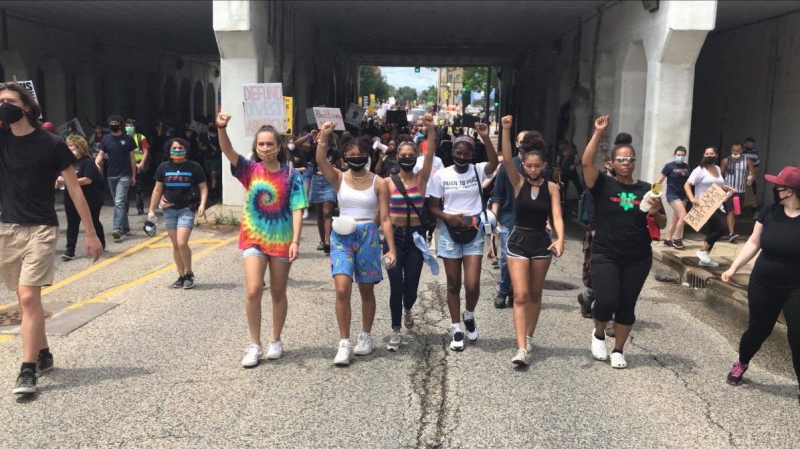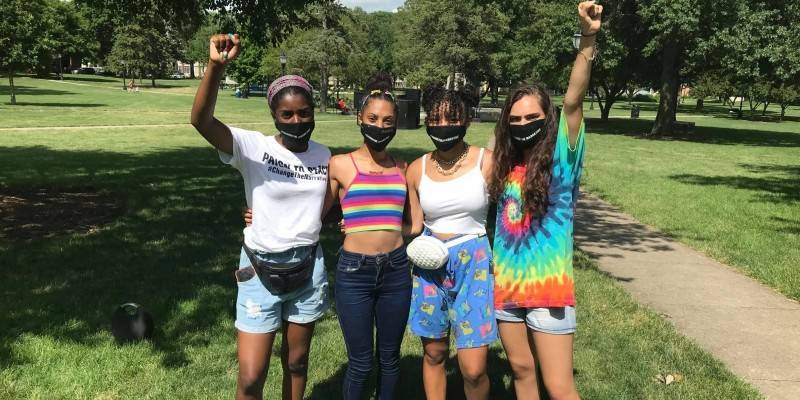It’s been a busy few months for the founding members of youth advocacy group Paign to Peace. Gaining traction in March 2020, this social justice group led by five local high school students has organized multiple peaceful protests in C-U for Black Lives Matter, Latinx and Indigenous communities, Black LGBTQ+ individuals, and other marginalized groups, all while going to high school full-time and adjusting to online learning.
I spoke with four of the five Paign to Peace co-founders: Naomi Dupree, Ayan Harris, Isabela Lleras, and Mayahuel Gutiérrez Malik over Zoom to talk about their organization, the impact Paign to Peace has had on the C-U community, and how they hope to grow their organization and eventually pass the baton to other youth activists in the future.
Smile Politely: Hello! Tell me a little bit about each of yourselves.
Naomi Dupree: I was born and raised in Champaign and just graduated from Central High School. I’m going to be playing soccer at Parkland College in the fall. I’ve always been interested in social justice and getting everyone in my community to talk about these issues. That’s what we’re all about — we all intertwined by being passionate about these issues and wanting to speak on them by using our voices.
Ayan Harris: I’m an incoming senior at Centennial High School. I’ve always been passionate about racial justice and social justice. It’s always been in my family, so it’s generational for me. I got involved with this organization through contacting Naomi and saying, “we’ve got to do something,” and that’s kind of how Paign to Peace came about.
Isabela Lleras: I’m going to be a senior in the fall at University Laboratory High School (Uni High). I’ve always been very interested in social justice and journalism and trying to find the facts in a situation; neutrality has always been interesting to me. I’m thinking about applying to UIUC for college to study political science and sociology.
Mayahuel Gutiérrez Malik: I’m also going to be a senior at Uni High and like Ayan, social justice work is very generational for me. My grandmother fought alongside César Chávez and Dolores Huerta and it got passed on to my mom who now does this work as an educator and a professor of U of I. So now, I’m doing a similar thing here, doing protests locally. I’ve been involved in these issues and thinking about these things since I was a kid, so it feels natural to be doing these things.
SP: How did you all meet and come together to create Paign to Peace?
Dupree: Paign to Peace was something I created my junior year in high school to try to get girls in my community talking about issues we were facing, but it didn’t get off the ground much, so I left it for a while. When the George Floyd situation happened, it was kind of the catalyst that brought us all together. I had been going to local protests and Justin Hendricks, one of our mentors, asked me if I had a team. I said, “I can make one!” and I knew these girls had been helping me out a lot. I knew that they couldn’t only help, but they could do more than I can in this organization and with their generational knowledge of what’s going on. After that, we all came together. It was a group of us doing this work before we added the name “Paign to Peace” to it.
SP: What would you consider to be your breakthrough moment?
Harris: It was a series of Ahmaud Arbery, and then Breonna Taylor… and George Floyd was the last straw. People were sick and tired. We’re the youth and we’ve got to use our voices, so we took action from there.
Malik: Social media also allowed this to gain momentum. We were all home, so we were all constantly on our phones looking at the news and absorbing this information. It was really hard not to look at this and not to think about the injustice happening, so I think that’s what made such a big uproar, especially in the younger generation. To be able to be like, “Wow, this is actually going on and I need to do something about it. And I can actually do something, even if I’m a young kid.”
SP: Your marches came following an increase in awareness of injustices that have been perpetrated against Black and Brown communities. What do you think fueled the response you received to your protests? Is there something different about the way people are reacting to these injustices in 2020 compared to before?
Lleras: There was unfinished business that remained after the Black Lives Matter movement started in 2015. I don’t think they achieved everything they wanted to achieve. This second uprising is a continuation. It feels easier now to learn than it ever has before. There are articles and even threads on Instagram that educate on social movements as well as sociological/psychological terms to describe what’s going on, so it’s even more accessible to the youth. To some degree you feel like it serves as proof, because nobody really seemed to take it that seriously. That’s why it’s even more powerful that we create these organizations like paint a piece, to show that we are a force to be reckoned with. And we are aware and we are an intelligent and informed.
Malik: I think the response and support is because we’re so young and we’re able to create such a big impact. I think other generations may have more faith in the people in power and think if we bring issues up to those in power, they’ll do something about it. But now, kids in high school are realizing that people in power aren’t doing anything. All of the adults should be able to see it nice and clear like we can. We’re going to do our part we’re going to tell all our younger siblings, make sure that generations under us understand this because we haven’t gotten that kind of education in school.
Dupree: I also think it puts the responsibility back in the hands of the adults. Telling them, “if you’re not going to do something about it, I will.” I remember going to my dad and telling him things were changing and that people were finally noticing what’s going on. It’s not going to be swept under the rug. He told me he remembered the Rodney King riots and said nothing changed. But then, all of this happened. And for me to be his daughter and be part of the movement…You can see that we had to wake up. We can’t just sit by idly and not do something about it.

Photo provided by Paign to Peace.
SP: You’ve organized protests for those who face social injustices and discrimination daily: Black, Latinx and Indigenous folks, immigrants, Black women, and LGBTQ+ individuals. What is the root goal of your organization?
Dupree: We want to be a safe space and a beacon of light for the youth to be able to speak about the issues and problems that they face in their communities, without backlash without judgment, and knowing you have people behind you that support you. It was hard for us to do ourselves, but we started to train with, “I may be young, I may be Latina, I may be Black, I may have these things that define me, but I can speak about them and our voices will be heard through organizations like this.”
Harris: We also want to get the elders, and the young people to actually kind of see eye to eye and to close that bridge gap. These are all of our collective goals, and we just have to figure out a way to fight these injustices. We want the same thing.
SP: Your slogan is #ChangetheNarrative. What kinds of change needs to happen in Champaign-Urbana and beyond?
Lleras: The assumption that any Black Lives Matter-related (BLM) protest is inherently violent, and the point of it is to incite violence, needs to change. We intentionally scheduled a peaceful protest because it happened right after the riots at Marketplace Mall. We said, “Let’s change this narrative, because right now everybody here thinks BLM is violent. We wanted to flip the switch, and encourage people to stop villainizing and demonizing Black people. Then it goes further because a big part of our organization is intersectionality and recognizing that discrimination with one identity can be connected to discrimination with another part of your identity.
Malik: To a certain extent, it’s also changing the narrative around youth. Issues aren’t too political to get into as kids. It’s not something you need to shelter us from because you can’t shelter us from the world, especially if you’re Black or Brown.
Dupree: Yeah, challenging the whole system. Changing the narrative even goes to the fact of people who say the system is broken. It’s spinning it to say, “It’s not broken. The system works exactly how it’s supposed to.” It’s changing it to the root level of where we start.
SP: How does it feel reflecting on this season of past few impactful protests?
Harris: It’s beautiful and heartbreaking. At the end of almost every protest, I start crying because I’m very moved by the movement. It’s something so real and raw. It’s happiness and sadness at once.
Dupree: It’s been a wild ride. I think it all kind of, even with the George Floyd stuff happening like we were already dealing with COVID and we are already dealing with people losing their jobs. The group came together so quickly and these past few months have been non-stop saying, “Okay, what do we need to do? What do we need to organize?” Reflecting on it, it is so beautiful, but it’s been an uneven scale just because we’ll do all this work and then I’ll go home and the world still works the way the world works.
Malik: It’s hard to remind yourself that this entire thing is a marathon. Sometimes we ask ourselves, we’re doing all this work for these protests and all of these people are coming out to stand with us and support, why isn’t anything happening? You look across the world it’s really easy to get disheartened and feel like you’re not making any impact. Especially with COVID going on, it’s like a seesaw, constantly going back and forth.
SP: How you see Paign to Peace growing and evolving in the future?
Dupree: We’d like to get to a place where we’re a nonprofit organization where people can put money into us and we allocate it back into the community in different ways, whether that goes towards holding educational events for local youth, making more research and books available to the community. We’re also definitely keeping an eye on challenging the ideals and the opinions and the laws and policies that are upheld that we think are wrong, and doing our part to getting people to vote. After the summer ends, you will kind of see a different side of us where we’re still doing the same things and we’re fighting for the same things, but going about it in different ways.
Harris: We also talked about doing a graduating chapter, just because we’re going to headed to college in the next year or so. We’re thinking towards the future and passing the baton down in a way that makes sure our message doesn’t get watered down, making sure it is the youth led by the youth, and making sure the ideas are always overflowing.
Follow the work of Paign to Peace on their website, Facebook, Twitter, and Instagram.








